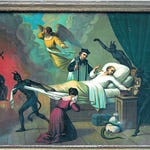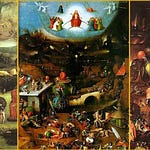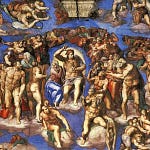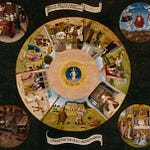And all flesh shall see the salvation of God (Gospel of Sunday. Luke iii. 1-6).
The Saviour of the world, Whom, according to the Prophet Isaias, men were to see one day on the earth — and all flesh shall see the salvation of God — has come. And He came on earth, says St. Augustine, that men might know how much God loves them. And how is it, O my dear Jesus, that Thou dost meet with so much ingratitude from the greater number of men?
I.
Adam, our first father, sins, and is condemned to eternal death along with all his posterity. Seeing the whole human race doomed to perdition, God resolved to send a Redeemer to save mankind. Who shall come to be man’s salvation? Perhaps an Angel or a Seraph? No, the Son of God, the supreme and true God, equal to the Father, offers Himself to come on earth, and there to take human flesh and die for the salvation of men. O prodigy of divine love! Man, says St. Fulgentius, despises God and separates himself from God, and through love for him God comes on earth to seek after rebellious man. Since we would not go to our Physician, He deigned to come to us, says St. Augustine. And why did Jesus resolve to come to us? Christ came, says the same holy Doctor, that man might know how much God loves him.
Hence the Apostle writes: The goodness and kindness of God, our Saviour, appeared (Tit. iii. 4). The singular love of God towards men appeared, as the Greek Text has it. And what greater love and goodness could the Son of God show us than to become Man and a worm like us, in order to save us from perdition? What astonishment should we not feel if we saw a prince become a worm to save the worms of his kingdom! And what shall we say at the sight of a God made Man like us to deliver us from eternal death! The Word was made flesh (Jo. i. 14). A God made flesh! If Faith did not assure us of it, who could ever believe it?
O my sweet, amiable, holy Child, Thou art at a loss to know what more to do to make Thyself loved by men! It is enough to say that from being the Son of God, Thou Wert made the Son of man, and that Thou didst choose to be born among men like the rest of infants, only poorer and more meanly lodged than the rest, selecting a stable for Thy abode, a manger for Thy cradle, a little straw for Thy bed. And yet few there are who know Thee! Few there are who love Thee!
II.
Tell me, O Christian, what more could Jesus Christ have done to win Thy love? If the Son of God had engaged to rescue from death His own Father, what lower humiliation could He have stooped to than to assume human flesh and to lay down His life in sacrifice for His salvation? Nay, I say more, had Jesus Christ been a mere man instead of One of the Divine Persons, and wished to gain by some token of affection the love of His God, what more could He have done than He has done for thee? If a servant of thine had given for thy love his very life-blood would he not have riveted thy heart to him, and obliged thee to love him out of mere gratitude? And how comes it that Jesus Christ, though He has laid down His very life for thee, has still failed to win thy love?
Men appreciate the good graces of a prince, of a prelate, a nobleman, of a man of letters, and even of a vile animal, and yet these same persons set no store by the grace of God — but renounce it for mere smoke, for a brutal gratification, for a handful of earth, for a whim, for a nothing! What sayest thou, my dear brother? Dost thou wish still to be ranked among the ungrateful ones? Go, seek for thyself one who is better able than God to make thee happy in the present life and in the life to come. Go, find thyself a prince more courteous, a master, a brother, a friend more amiable, and who has shown thee a deeper love. O Lord, who is like to thee? (Ps. xxxiv. 10). O Lord, what greatness shall ever be found like to Thine?
Love, then, love, O souls, love this little Child, exclaims St. Bernard, for He is exceedingly to be loved. Great is the Lord, and exceedingly to be praised! The Lord is a little One and exceedingly to be loved!
O my dear Jesus, how is it that Thou dost encounter such ingratitude from the greater number of men? In the time past, I, too, have not known Thee; but heedless of Thy love, I have sought my own gratification, making no account whatever of Thee and of Thy friendship. But now I am sorry for it. I grieve over it with my whole heart. O my sweet Child, and my God, forgive me for the sake of Thy Infancy. Thou knowest my past treasons; for pity’s sake do not abandon me or I shall fall away even worse than before. O Mary, great Mother of the Incarnate Word, do not thou abandon me! Thou art the Mother of perseverance and the stewardess of divine grace. With thy help, O my hope, I trust to be faithful to my God till death.











